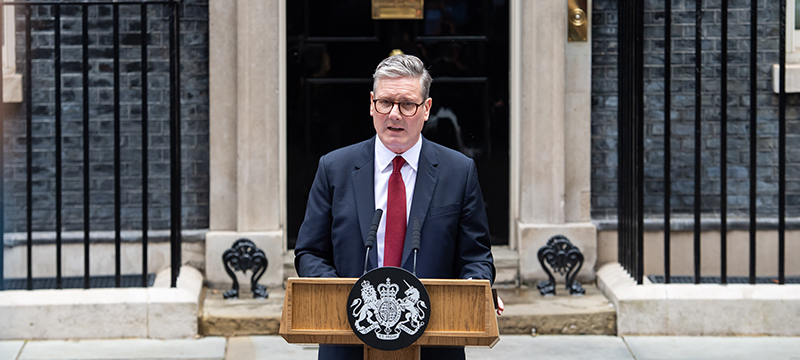by Revd Dr Matthew Roberts
A week before Christmas 2023, social media and the press gave a rather stunning announcement: the Pope had given his approval to same-sex blessings. In a Doctrinal Declaration issued by the Vatican and signed off by Pope Francis, a major change had been signalled.
Except that almost immediately, various writers – both inside and outside the Roman Communion – started saying that it had not. All that the Vatican and Francis had done was restate the existing position that priests may pronounce informal blessings without enquiring into the moral state of those they are blessing, as they have done for centuries, even in the case of a fornicating boxer (as explained in this article). It’s actually a statement of refusal to change doctrine in the face of strongly revisionist challenges within the Roman magisterium. Others despaired of finding any theological or logical coherence in the statement at all, in one case likening it to a black hole that sucks in those who try to understand it.
I am no expert on the politics of the Vatican and will leave discussion of that to others. Nor, of course, am I (a Presbyterian minister) inclined to be either impressed by or swayed by much that emanates from the Pope. Nevertheless, given the significance of the topic and the times in which we live, I think there are some important things here for us to learn from.
So first, what about the claim that nothing has changed, and this is just a restatement of Vatican orthodoxy on sexual ethics? The first problem with that is that it is decidedly not how the Vatican itself has presented this. The Vatican News reported the publishing of Fiducia Supplicans by saying in multiple ways that this is a genuine change. It ‘opens possibility of blessing couples in irregular situations’; ‘with the Declaration… it will be possible…’; ‘there is now consideration of the possibility of welcoming even those who do not live according to the norms of Christian moral doctrine’ (italics mine); it is 23 years since they last published ‘a document of such doctrinal importance’; a pronouncement of 2021 is ‘now further developed and superceded’. The Declaration itself says that it offers a ‘specific and innovative contribution to the pastoral meaning of blessings, permitting a broadening and enrichment of the classical understanding of blessings’[1] (italics original). At a critical point in the argument, it declares that ‘Within the horizon outlined here appears the possibility of blessings for couples in irregular situations and for couples of the same sex’[2] (italics mine). In other words, the Declaration deliberately presents itself as introducing something new in the Church of Rome’s teaching. Now it is possible that this is duplicitous, seeking to present pure continuity as something that it is not; but that seems unlikely. Certainly the Vatican wishes people to believe that there is a genuine change of some sort here.
So what is that change? Fiducia Supplicans (FS) is adamant that the doctrine and practice of marriage is not changed. I’ll come back to why that is not really so in due course, but we’ll let it pass for now. What is clear is that the blessings which FS permits are only ‘spontaneous’ blessings in non-liturgical situations; they must not have a fixed liturgical form or be done in conjunction with a marriage liturgy or indeed a civil union; they must be ‘simple gestures’ and it’s important to be ‘careful that they should not become a liturgical or semi-liturgical act, similar to a sacrament’. What FS has in mind is situations ‘such as a visit to a shrine, a meeting with a priest, a prayer recited in a group, or during a pilgrimage’.
But again, this is not new. The Roman understanding of blessings – not one with which most Protestants have sympathy, of course – is such that priests can pronounce blessings in all sorts of situations, on both people and inanimate objects.[3] The idea that two people could encounter a priest at a pilgrimage shrine and ask for, and receive, a blessing, is hardly new territory for Rome.
So what is new here then? I think it is this: the willingness to declare a blessing on people engaged in ongoing and open sin, known to the person offering the blessing, of which they have no intention of repenting.
The Declaration goes to considerable lengths and linguistic gymnastics to achieve this result. The basic argument is an appeal to God’s unconditional love. There is a ‘danger that a pastoral gesture that is so beloved and widespread will be subjected to too many moral prerequisites’; doing this ‘under the claim of control, could overshadow the unconditional power of God’s love’;[4] Francis is quoted as saying that we should avoid being ‘judges who only deny, reject, and exclude’[5].
Two paragraphs particularly make this point.
‘Pope Francis urges us to contemplate, with an attitude of faith and fatherly mercy, the fact that ‘when one asks for a blessing, one is expressing a petition for God’s assistance, a plea to live better, and confidence in a Father who can help us live better.’[12] This request should, in every way, be valued, accompanied, and received with gratitude. People who come spontaneously to ask for a blessing show by this request their sincere openness to transcendence, the confidence of their hearts that they do not trust in their own strength alone, their need for God, and their desire to break out of the narrow confines of this world, enclosed in its limitations.’ (para. 21)
The problem with this is that, in the specific case of a homosexual couple asking for a blessing, these statements are not true. In fact, given that they are deliberately and habitually engaging in sin, and asking to be blessed with no intention of repenting of that sin, there is here the very opposite of a ‘sincere openness to transcendence’ or ‘a petition for God’s assistance’ – at least if the Church is correct to have ‘always considered only those sexual relations that are lived out within marriage to be morally licit’.[6] FS here directs that a request for a blessing from the openly unrepentant be treated as if it emerged from a truly penitent heart.
Paragraph 25 drives this home with a crashing false dichotomy, quoting Francis himself:
‘The Church, moreover, must shy away from resting its pastoral praxis on the fixed nature of certain doctrinal or disciplinary schemes, especially when they lead to ‘a narcissistic and authoritarian elitism, whereby instead of evangelizing, one analyzes and classifies others, and instead of opening the door to grace, one exhausts his or her energies in inspecting and verifying.’ Thus, when people ask for a blessing, an exhaustive moral analysis should not be placed as a precondition for conferring it. For, those seeking a blessing should not be required to have prior moral perfection.’
By setting up the only options as narcissistic elitism which does exhaustive moral analysis demanding moral perfection, or entirely abstaining from any moral inquiry or requirements at all, the possibility that the loving thing to do might be to gently warn that there can be no blessing for those who do not repent, but that the door of God’s grace is open for those willing to do so, is entirely omitted. And so of course the commended option is the one of blessing, even where the sin is public and flagrant, and there is no intention of repentance. ‘God never’, we are told, ‘turns away anyone who approaches him!’[7] He does, of course, as Nadab and Abihu, King Uzziah, Ananias and Sapphira, Simon Magus, and of course Judas, found out; for to approach God with an unrepentant heart is to invite his judgment upon us. But in the world of Fiducia Supplicans the possibility is not even considered.
Thus it is here that the doctrinal innovation of FS is to be found. It was always the case that a priest could bless people without enquiring into every detail of their domestic situations. But that is quite different to encouraging blessing a group of self-professed mafia hitmen, or a swingers club, or the proprietors of a factory employing child labourers, when both the priest knows all about those sinful habits and that those living in them have no intention of turning away from them. It is this blessing-of-public-sin-without-repentance to which Fiducia Supplicans opens the possibility.
The fact that this is applied to the presenting issue of extra-marital sexual relations, and homosexual relations in particular, makes this particularly stark. If the sin of sexual immorality – homosexual relations included – can now be overlooked, and blessings given in the absence of repentance, it is to say the least questionable whether the doctrine of marriage (which after all finds its most common biblical expression in the stern prohibition of sexual immorality) really has emerged unscathed. Nevertheless, the Declaration has clearly been framed to achieve the former result while seeking to preserve doctrinal deniability on the latter.
Why this matters for orthodox Christians in other denominations
This matters for two reasons. First, because this shift in Vatican policy is unavoidably a move away from the straightforward naming of homosexual sex and relationships as sin and calling for those engaged in them to repent. And this will be taken – as it already has been, and (it is hard to avoid the conclusion) it was intended by the Vatican to be – as an admission that the church has been at least partly wrong in its firm stance on sexual ethics up to now. That, along with the capitulation of the Church of England, will mean that there is simply no longer any safety in numbers for Christians on this issue. Those who wish to remain faithful to the Christian understanding of marriage will find themselves under ever increasing pressure likewise to surrender from a world which will no longer think that we hold these things because we are Christians, but now simply because we are bigots.
But the more important reason is the second: it focuses the issue on the significance of repentance. It might seem implausible, but Fiducia Supplicans makes basically the same point which was made with immeasurably less art and guile by Jayne Ozanne in an article one week earlier: that repentance is not necessary for God to grant salvation. And that is where the battle for the true Christian faith is to be fought in our day.
For it is repentance which is the great offence. It is Christ’s call to repent of our sins which outrages the sinful human heart. It was so for the Pharisees, it was so for Herod, for Saul of Tarsus before his conversion, for the silversmiths in Ephesus, and it remains so today. This is because the call to repent confronts us with the fact that we are not what we are supposed to be, even in the nature we have inherited from our parents. It holds a mirror up to my pride and tells me that, far from the good person I thought I was, I have not only sinned but was conceived and born in sin; what I am by nature is not a recipient of God’s congratulations but an object of his wrath (Ephesians 2:3). The call to repent is a call to tear our hearts (Joel 2:13).
Yet this confronting me with my sin, calling me to mourn over it and turn away from it, far from being the opposite of his grace (as FS repeatedly implies) is precisely what his saving grace looks like. The first command of our Lord – ‘Repent’ – is immediately followed with the second, and inseparable from it: ‘and believe the good news’. Faithful are the wounds of a friend, says Solomon (Proverbs 27:6); and Christ’s wounding words of the need for repentance are the purest expression of his love. Only so can he wake us up from the destructive power of sin, and call us to leave it behind and come to him who alone can give us forgiveness and the transforming power of the Holy Spirit.
There is simply no way for the call to repent to be given without giving offence; and in the world in which we now live, that offence is once again growing to have serious social and legal force. It is the call to repent which those calling for ‘conversion therapy’ legislation seek to criminalise; it is the call to repent which is falsely believed to be profoundly psychologically damaging by those wedded to the doctrine of the inherent goodness of the human psyche. If we are to preach Christ’s gospel faithfully in our generation, it is here that the battle will be fought.
Yet we should not lose heart. Christ is Lord. His Church is still his beloved bride, and his gospel word is still going forward by the power of the Spirit. He is still rescuing and purifying his people from their sins. He still grants repentance and forgiveness from heaven to his chosen people (Acts 5:31). If Fiducia Supplicans means anything to us, let it be a warning to us never to forget that repentance is at the heart of the gospel of Christ.
Revd Dr Matthew Roberts
A co-author of the Greater Love Declaration, Matthew Roberts is Minister of Trinity Church York and former Moderator of the International Presbyterian Church.
[1] Fiducia Supplicans, Presentation
[2] Ibid, Para. 31
[3] Ibid., para. 8
[4] Ibid., para. 12
[5] Ibid, para. 13
[6] Ibid., para. 11
[7] Ibid., para. 33














